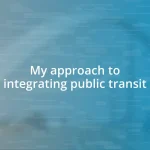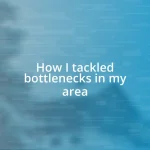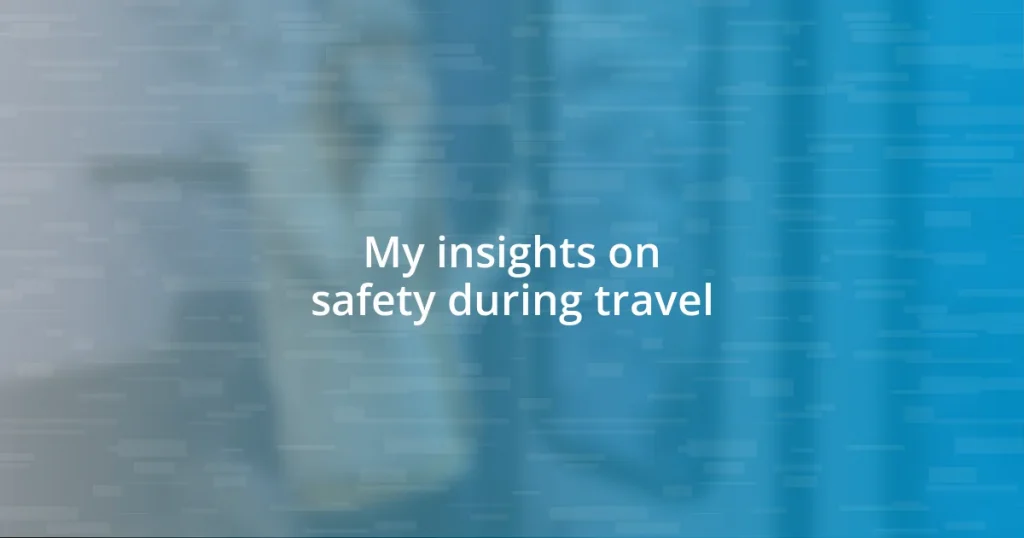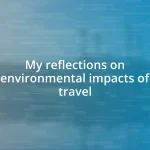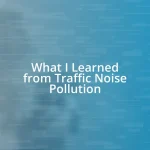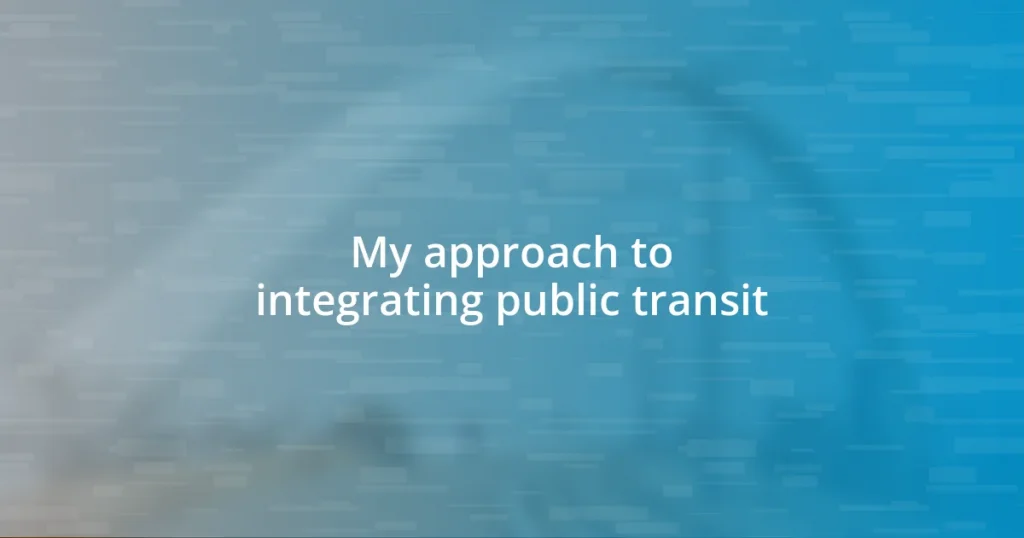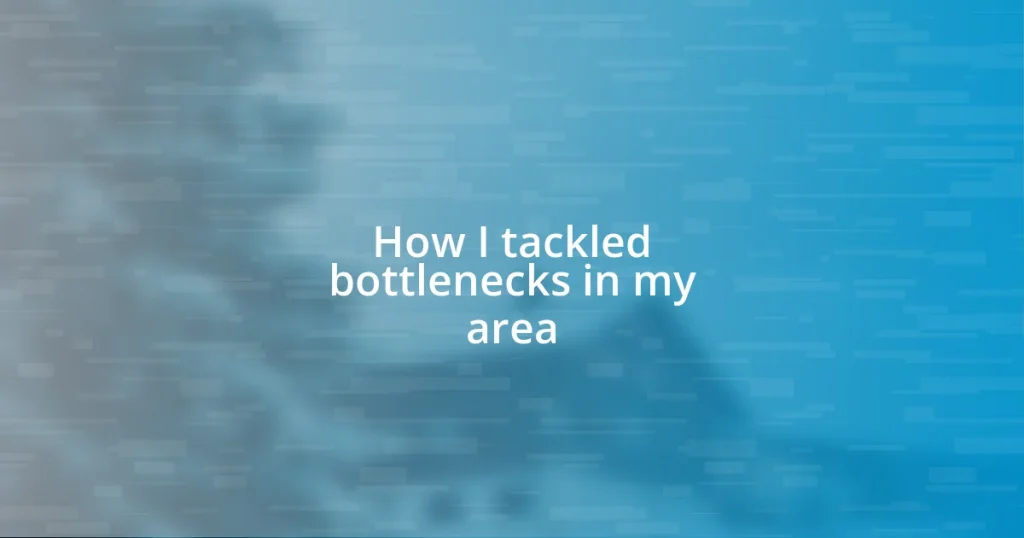Key takeaways:
- Understanding travel safety involves being aware of surroundings, trusting instincts, and engaging with local customs to enhance peace of mind.
- Effective travel preparation, including detailed itineraries, emergency contacts, and understanding local laws, significantly reduces anxiety and increases safety during trips.
- Staying aware and blending in with locals, along with a proactive approach to emergency planning, can help travelers navigate unfamiliar environments safely.
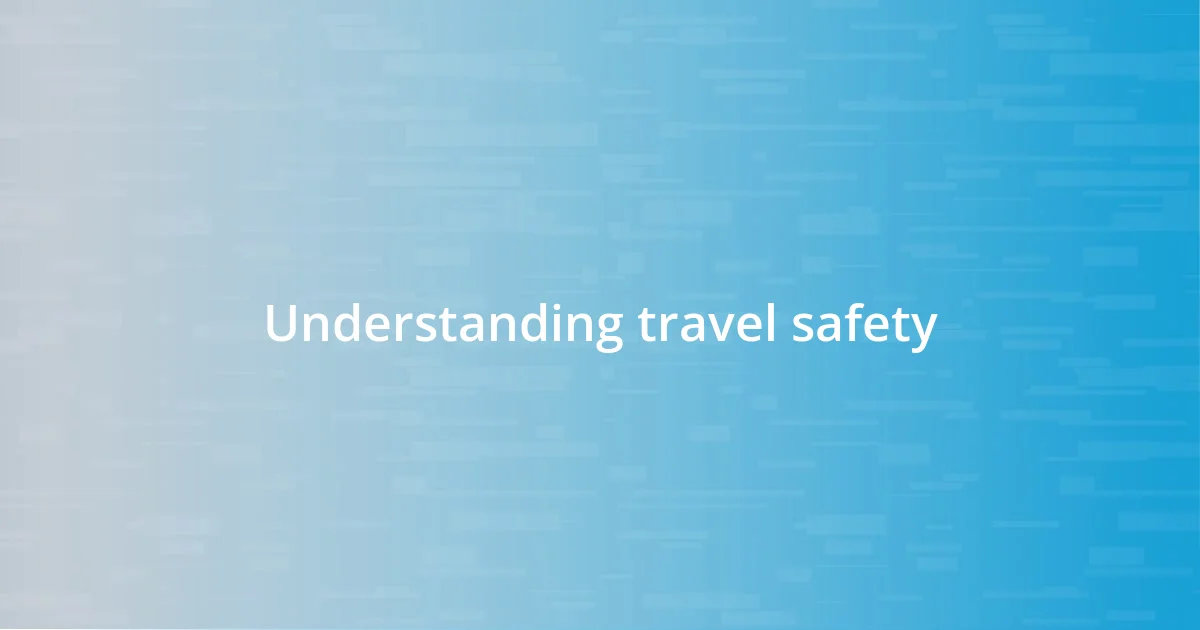
Understanding travel safety
Understanding travel safety is more than just checking off a list of precautions; it’s about feeling secure in unfamiliar environments. I recall a trip to Europe where I navigated bustling streets and crowded markets. The constant hum of excitement was often overshadowed by the awareness of my surroundings—what if my wallet was snatched, or worse, what if I lost my passport?
When I think about safety, I often ask myself: how can I protect not just my belongings, but also my peace of mind? It’s essential to set boundaries and trust your instincts; sometimes, that means avoiding certain areas or declining an invitation. In one instance, while hiking in a remote area, my gut feeling nudged me to turn back before dark, and that decision kept me safe and sound.
I also find that understanding local customs and safety practices plays a big role in how secure you feel. For example, when I was in Japan, I quickly learned that the culture emphasizes respect and harmony, which made me feel more at ease. Engaging with locals can provide insights that you might not find in a guidebook, creating a richer travel experience while ensuring you remain attentive to safety.
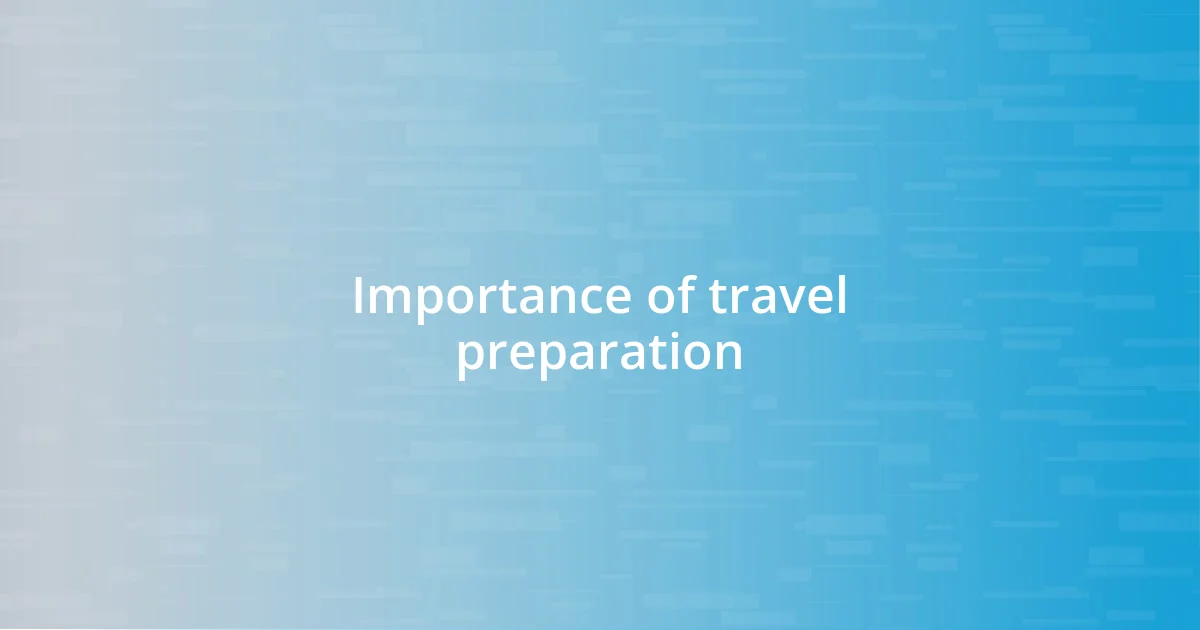
Importance of travel preparation
When I reflect on the importance of travel preparation, I can’t help but remember my first solo trip abroad. I was a bundle of nerves, with a crammed backpack and a million questions swirling in my mind. However, laying out my itinerary, checking transportation options, and mapping out my accommodations allowed me to step out of that airport with confidence. I realized then that being prepared isn’t just about ensuring you have all your documents; it’s about equipping yourself mentally for the adventures ahead.
Effective travel preparation includes a variety of essential tasks, each contributing to a well-rounded travel experience. Here’s a quick checklist that helps me feel ready:
- Research your destination’s safety ratings and areas to avoid.
- Create a detailed itinerary that includes accommodations, transport, and emergency contacts.
- Learn a few key phrases in the local language; it can make a world of difference.
- Pack a small first-aid kit for those unexpected scrapes or sicknesses.
- Keep digital backups of important documents, just in case.
By investing time in these preparations, I find that my anxieties diminish, allowing me to truly immerse myself in the journey ahead.
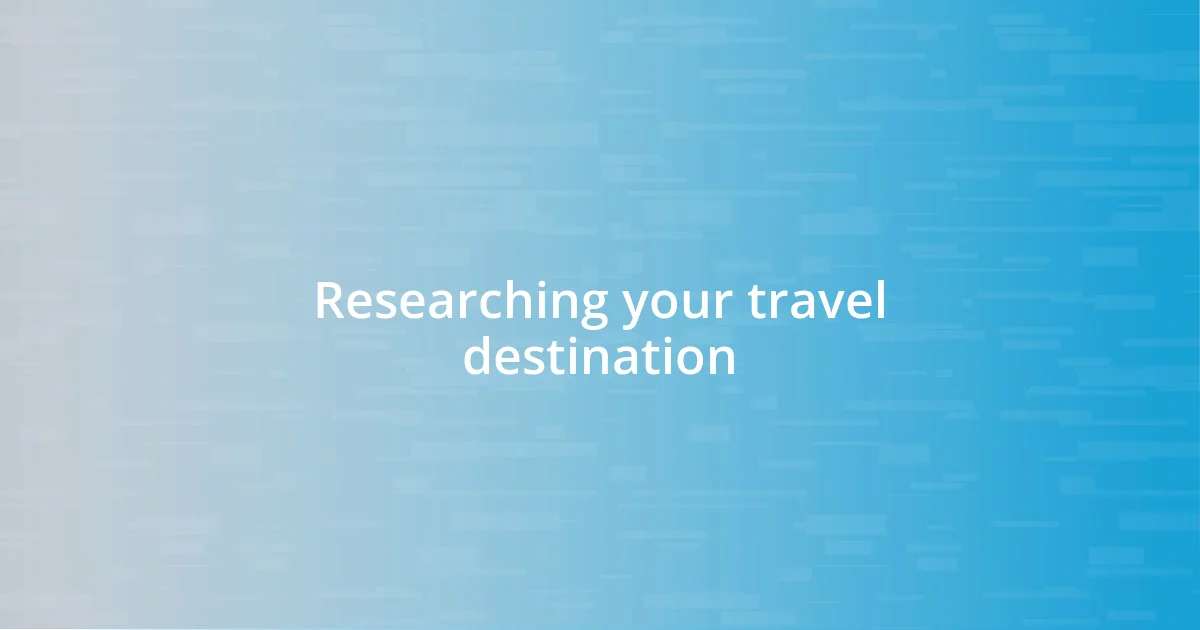
Researching your travel destination
When it comes to researching your travel destination, I often think about the balance between excitement and caution. One memorable trip took me to a vibrant city bustling with life. As I planned, I stumbled upon an online forum where travelers shared their experiences. There, I learned about a hidden gem of a neighborhood that was safe and welcoming, contrasting sharply with advice about sketchy areas to avoid. These insights not only shaped my itinerary but also gave me a greater sense of security, knowing I’d chosen the right spots to explore.
Digging deeper into your destination enhances safety by equipping you with knowledge. I’ve found that understanding the local crime statistics and safety measures can alter your entire perspective. For example, during my recent travels in South America, I discovered that early evenings were safer for exploring local markets. This knowledge allowed me to enjoy vibrant experiences without unnecessary worry—a small detail that makes a significant difference.
Additionally, checking travel advisories is a vital part of preparing for any trip. In my experience, government websites can offer critical updates about political climates, health concerns, or natural disasters. One time, I almost booked a trip without checking the news first. Thankfully, a quick glance revealed a temporary safety warning. Researching beforehand is not just about gathering data; it’s about weaving together the threads of your journey—finding connection in unknown places while keeping safety at the forefront.
| Source of Information | Impact on Safety |
|---|---|
| Local Travel Forums | Unique insights from fellow travelers |
| Government Travel Advisories | Real-time updates on safety concerns |
| Online Maps and Safety Ratings | Helps in identifying safe areas |
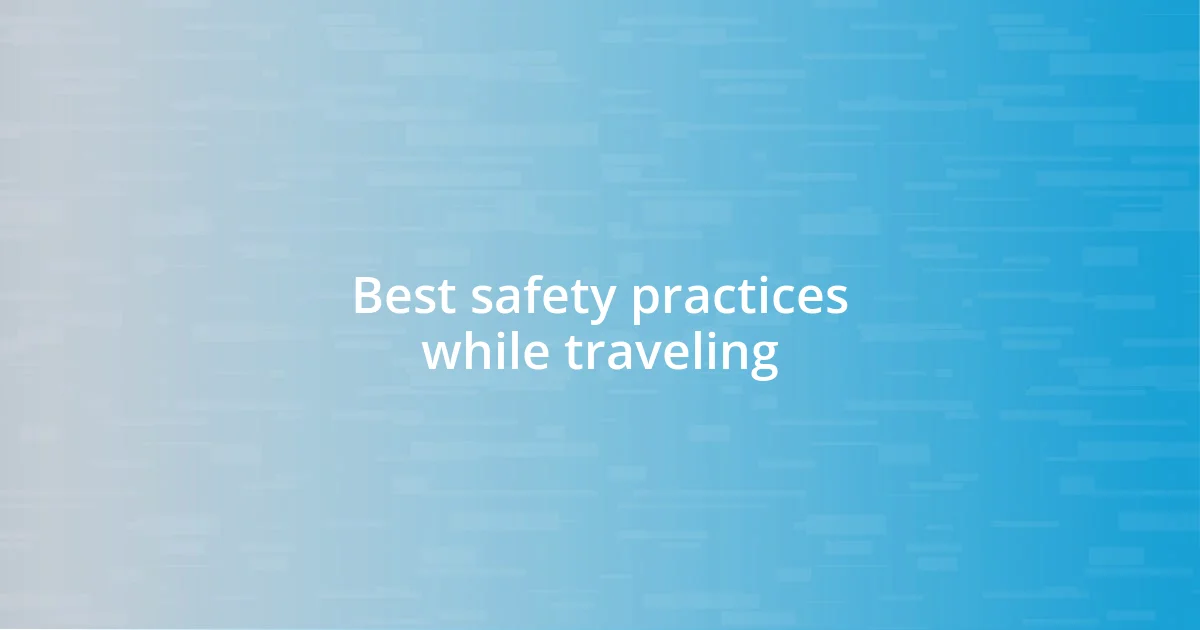
Best safety practices while traveling
There are several safety practices I carry with me on my travels that have served me well over the years. One that stands out is staying aware of my surroundings. I remember walking through a stunning market in Thailand, and despite being enamored by the vibrant colors and scents, I made a conscious effort to keep my belongings close. Have you ever felt that nagging instinct that something’s off? Trusting that feeling can guide you away from potential trouble.
Another important practice is to avoid flashy displays of wealth. I learned this lesson the hard way. On a trip to Barcelona, I wore a new designer backpack, and although I was proud of it, I quickly shifted my mindset when I noticed some wary gazes. It made me rethink my choices. Instead, I opted for a simple, more discreet bag, which let me blend in and focus on enjoying the sights without worrying about theft.
Lastly, I can’t stress enough the importance of having reliable communication options while traveling. There’s nothing worse than feeling cut off. On a solo adventure in Japan, I activated an international data plan for my phone. It allowed me to easily access maps, find restaurants, and connect with locals. Having that source of connectivity helped me navigate both the city and any potential dilemmas. What peace of mind comes from being able to reach out, don’t you think?
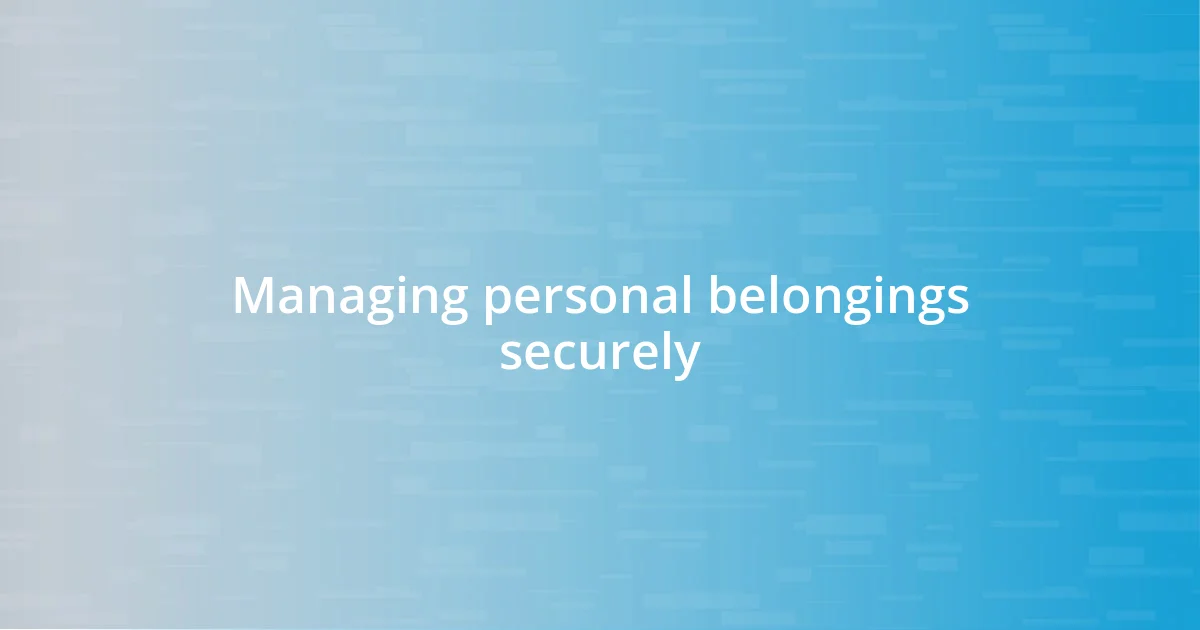
Managing personal belongings securely
When managing personal belongings securely, I’ve learned the hard way that choosing the right bag is crucial. On my first solo trip to Paris, I opted for a stylish handbag that I thought would turn heads. However, I soon realized it also caught the attention of pickpockets. After a near miss, I switched to a crossbody bag with zippers and hidden pockets, which not only kept my essentials safe but also allowed me to enjoy the city more freely. Have you ever felt that sense of relief when you know your belongings are well-secured?
I also make it a point to keep emergency backups of my important documents, like my passport and travel insurance policy. During a lively trip to Buenos Aires, I decided to leave a photocopy of my passport with my friend, just in case. It turned out to be a lifesaver when I misplaced my original while exploring a bustling street fair. Knowing that I had a backup gave me a sense of security and allowed me to handle the situation without panic. Isn’t it comforting to know you have a safety net?
Lastly, I can’t emphasize enough the importance of hotel room security. I always play it safe with a portable door lock, especially when traveling solo. I recall a trip to Istanbul where I secured the main lock and added a portable one for extra peace of mind. It wasn’t just about protecting my belongings, but feeling truly at home in a foreign place. What little enhancements do you think could transform your sense of security while traveling?
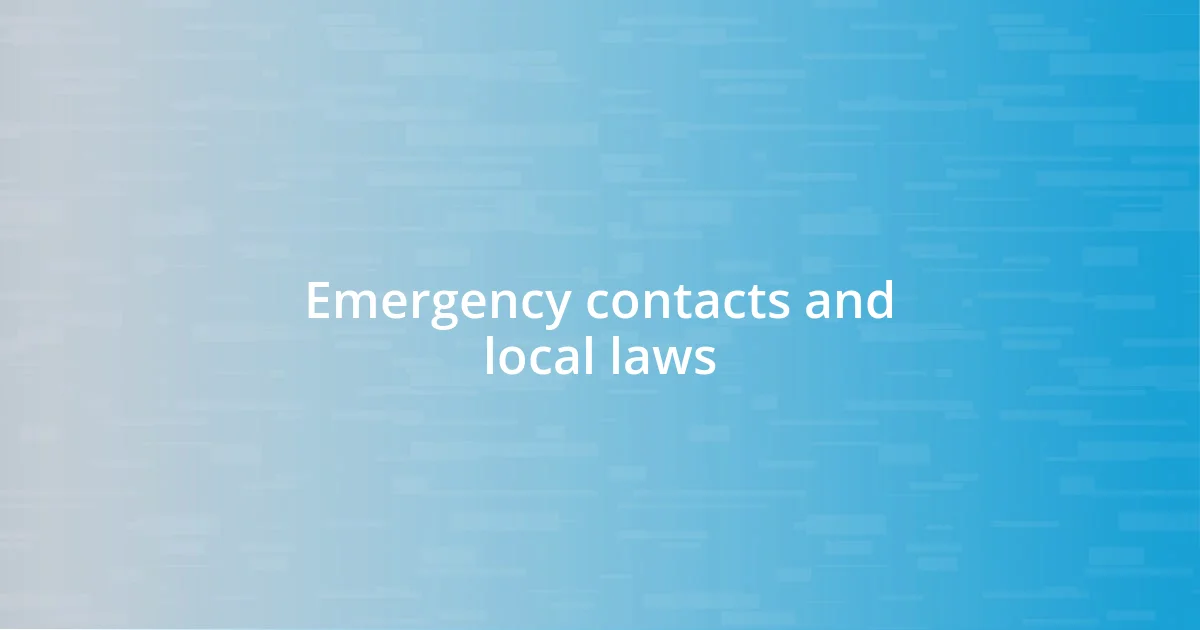
Emergency contacts and local laws
I can’t stress enough how critical it is to have your emergency contacts easily accessible while traveling. I always save local emergency numbers in my phone before I leave, ensuring that if something happens, I can reach help without scrambling to find information. For instance, during a road trip through New Zealand, I had noted down the number for local police and medical services, which turned out to be invaluable when a fellow traveler had a minor accident. Isn’t it reassuring to know help is just a few taps away?
Understanding local laws can also keep you out of trouble. On my last trip to Singapore, I was amazed by their strict regulations; even chewing gum is banned! At first, I thought this was excessive, but I quickly realized it added to the cleanliness and orderliness of the city. It taught me the importance of researching local laws before arriving—something as simple as this can prevent misunderstandings and a possible run-in with authorities. Have you ever found yourself surprised by a local rule while away from home?
Moreover, I always carry an emergency information card in my wallet, listing my contacts, allergies, and any important medical details. On a hiking trip in the Canadian Rockies, I met a group of fellow adventurers who were shocked when I pulled it out before we started. It felt good knowing I was prepared, especially when some of them had never thought about it. How often do we consider our safety measures until we’re faced with a potentially dangerous situation? I find that being proactive in ensuring my safety brings a sense of calm, allowing me to soak in the beauty of every new destination.

Staying aware and vigilant
Being aware of your surroundings is a game-changer when traveling. I remember wandering through the vibrant markets in Marrakech, where the colors and scents were intoxicating. Yet, I made it a habit to glance around and take note of people and exits. This vigilance not only kept me grounded but also heightened my appreciation for the chaos around me. Has there been a time when you felt a twinge of unease that made you more alert?
Moreover, I’ve found that blending in with the local crowd can serve as a safety strategy. On a recent trip to Tokyo, I opted for casual, local attire instead of my usual tourist gear. This simple choice allowed me to move about the city confidently, as I observed others and learned the rhythm of daily life. It struck me that when you appear confident and aware, you’re less likely to attract unwanted attention. Have you ever thought about how dressing like a local can enhance not just your experience, but also your safety?
Finally, developing a routine for staying aware is essential. Each morning, I make it a point to check the news for any local incidents or safety advisories before heading out. While visiting Barcelona, I learned about a spike in petty crime in certain areas, allowing me to adjust my plans accordingly. I felt a sense of empowerment knowing that I was informed rather than reactive. Isn’t it comforting to navigate your travels with eyes wide open, ready to embrace the adventure while prioritizing your safety?


